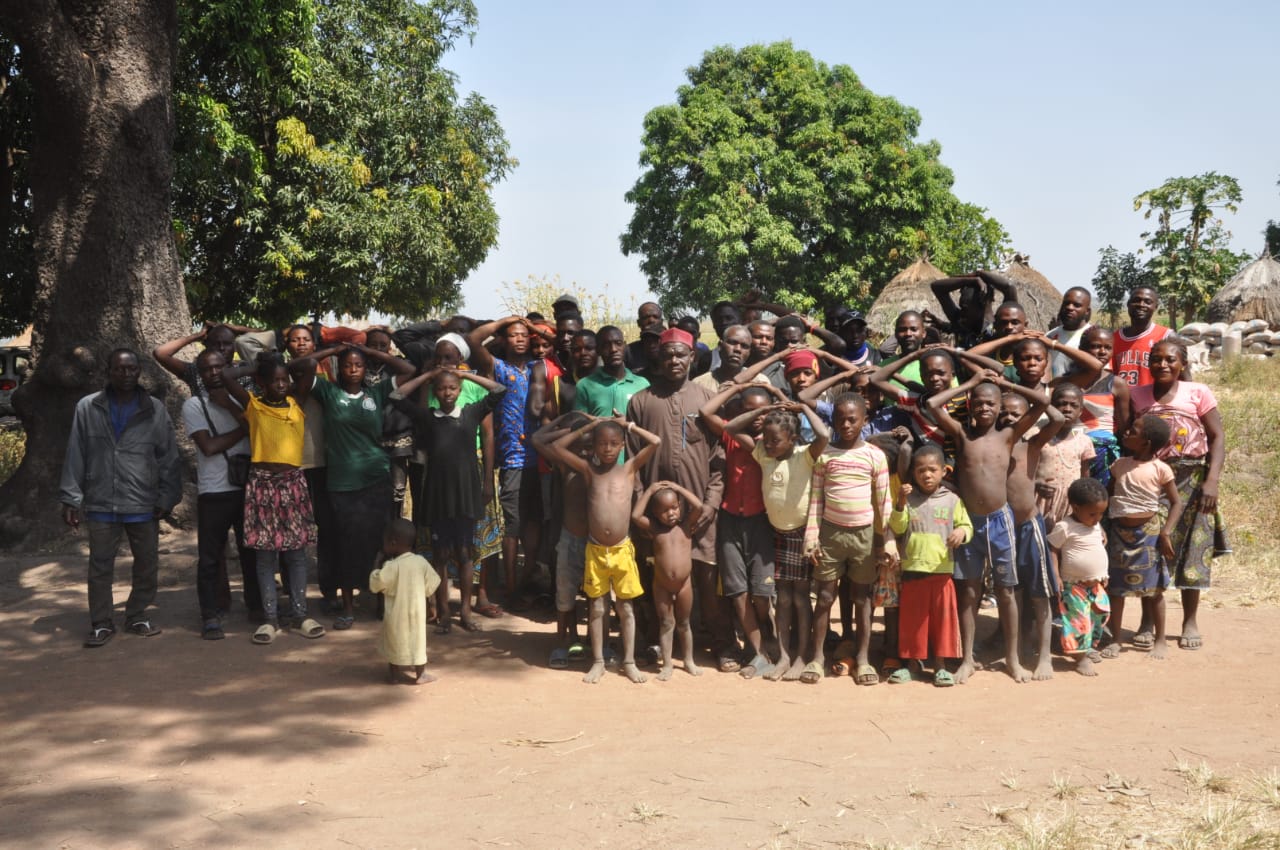NEWS
Tiv Farmers in Awe LGA Accuse Government Officials of Forcefully Harvesting farm produce

By Abel Zwànke, Lafia
Tiv farmers in Awe Local Government Area of Nasarawa State have accused government officials of forcefully harvesting their rice crops, allegedly under the directive of the state government. The accusations center around the Chief of Jangwa, Shehu Adamu, who the farmers claim led the harvest with the support of security personnel, including heavily armed soldiers.
They claim their rice crops are being forcefully harvested by individuals led by the Chief of Jangwa, Shehu Adamu, allegedly acting under orders from the state government. When our Correspondent visited the communities on Friday who are predominantly Tiv farming communities, with a population of over 10,000, are in turmoil as their main source of livelihood is being threatened. Some farmers alleged that security personnel, including heavily armed soldiers, accompanied the officials to their farms to carry out the harvest.Narrating his ordeal, Mr. Joseph Faga, one of the affected farmers, said, “The planting season was peaceful, but everything changed during harvest. I found the commissioner overseeing the Ministry of Agriculture, the local government chairman, and the chief of Jangwa harvesting my rice. When I confronted them, they said it was an order from the state government.”Faga added, “They have been threshing my rice for three days now under tight security. I feel helpless watching my hard work being taken away like this.”Another farmer, Mr. Vitalis Chiangi, expressed similar anguish, describing the situation as devastating. “This rice is our only source of income and survival. We plead with the authorities to intervene before things escalate further,” he said.Community leader Iorlaha Aloysius accused the government of acting contrary to a court order and ignoring the farmers’ rights. “The land is not under dispute, and a high court in Abuja had restrained the state government or any party from interfering with the Tiv farmers. If the government wants the land, they should call for dialogue instead of harvesting our crops without notice. This is unjust and inhuman,” Aloysius stated.The farmers estimated that over 400 bags of rice had already been harvested from their farms, leaving them in dire straits.When contacted, the chairman of Awe Local Government Area, Hon. Dankano, denied any involvement in the matter. “I am not aware of such an incident, but I will investigate and provide more information,” he said. When pressed about allegations that he was present during the harvest, Dankano maintained, “I have no knowledge of the situation, but I will look into it and revert.”Governor Abdullahi Sule recently addressed similar concerns during a visit to Jangwa Development Area, where the state government oversaw the harvest of 2,000 hectares of rice. “The state government has no intention of forcefully taking land from anyone. If there is a need for land acquisition, the right processes, including compensation, will be followed,” the governor assured.The governor also dismissed allegations circulating on social media about the government’s involvement in the forced harvesting of farmers’ crops. “We are committed to ensuring transparency and fairness in our operations,” he added.The affected farmers have called on the state and federal governments to investigate the incident, return their harvested rice, and ensure that such occurrences are prevented in the future.NEWS
Enhancing Agricultural Productivity Through Research

By Abachi Ungbo
Agriculture is an important economic activity that is providing employment to a huge segment of the Nigeria population and also contributing to the nation’s Gross Domestic Product (GDP).It is dominated by small holders on whose thin shoulders the needs of the entire population rest upon.
The productivity of their farmlands is small and their income hardly commensurate with the huge effort they apply. They are overwhelmed by not a few challenges which have continued to haunt the nation in general.No doubt, Nigeria agriculture is struggling to unleash its full capacity despite many efforts. It is worrying that the overall productivity of the sector hasn’t dramatically improved in the face of growing population, nutritional deficiency, effect of climate change, volatile food prices and pervasive poverty.Agricultural production continues to be hobbled by familiar challenges associated with low crop yield, incidence of pest and diseases, post- harvesting losses, plummeting soil fertility etcThe poor state of agriculture underscores the necessity for extraordinary approaches and strategies in circumventing the host of challenges to unlock the boundless capacity of agriculture to ensure it serve its purposes.In 2013 in Maputo, the African Union (AU) under the Comprehensive Africa Agriculture Development Program (CAADP) laid out an elaborate plan for the development of Africa’s agriculture with an agreement by member states for the allocation of 10% of public expenditure to agriculture and an 6% annual growth of the sector. In 2014, under the Malabo declaration, member states reaffirmed their commitment to the vision.Interestingly, meeting the goal as enshrined in the CAADP remains a tall order! A case in point is the 2025 national budget. Agriculture was allotted 826.5 billion naira which constituted about 1.73% of the total budget of 47.97 trillion naira – a far cry from the agreement. In the budget, 40 research institutes were allocated 126.03 billion naira while federal universities of agriculture got 54.38 billion.The allocation to the institutions is paltry judging from the huge financial requirement inherent in undertaking any meaningful research activity and in running the institutions. The Pillar IV of the CAADP placed emphasis on agricultural Research and Development (R&D).A vibrant research- led approach stands as a conspicuous missing link in the chain of agricultural production. We are witnesses to the infinite human ingenuity which has always been brought to bear in making agriculture responsive to emerging challenges leading to massive revolution in the sector through a multidisciplinary approach.Research has always provided answers to challenging questions that have changed the trajectory of agriculture. Agricultural research ensures that new technologies, techniques and practices are developed to improve productivity.Instructively, improving agricultural productivity is a foolproof strategy for promoting inclusive economic development and reducing poverty. Through the strategy, the income of farm households is ramped up and food cost curtailed which serves as a cushion to non-farm households who are known to expend a massive amount of their income on food.Agricultural research has a long history in Nigeria leading to the establishment of many research institutes and universities of agriculture. As well as a body known as Agricultural Research Council of Nigeria saddled with the responsibility of supervising and coordinating agricultural research and extension activities.In effect, the country has one the most elaborate National Agricultural Research Systems (NARSs) in Africa.Through public funding the institutions have recorded massive achievement. However, they are currently a shadow of their former selves. Their current state tells a sad story of neglect and underfunding. The entire institutions have a similitude of challenges which has continued to limit the actualization of their mandate.The institution needs to be well funded to promote productivity, sustainable growth and general transformation of the sector. It is against this background, that the recent National Agricultural Development Fund (NADF) report on the baseline survey and need assessment carried out on 16 agricultural institutions and 17 colleges of agriculture requires massive attention in order to place the research institutions on the path of glory.Research and Development can never be successful without sufficient funding. The effectiveness and efficiency of the research can be narrowed to the generous monetary allocation that will cover the operating costs of the institutions, salaries, training and capacity building, investment in modern laboratories, equipment, relevant research facilities and data management system.The entire approach to research needs to be attractive enough to draw and retain talents. The place of accountability and transparency cannot easily be discounted in the entire management system of the research institutions. Also, is the need for strengthening the extension system. Access to new technology and practices by the end users through the agency of a vibrant extension system is imperative and must have its wheels adequately oiled.In the final analysis, productivity will further be enhanced through the synthesis of improved agricultural research funding and the continuation of policy reforms.Abachi Ungbo, abachi007@yahoo.comNEWS
Gov Adeleke Deploys 1,750 Imole Teachers Corps to Osun Schools

From Ayinde Akintade, Osogbo
As financial constraints delay planned mass teachers’ recruitment, Governor Ademola Adeleke has deployed a total of One Thousand, Seven Hundred and Fifty Imole Youth Corps teachers to primary and secondary schools across Osun state.The Governor is also seeking more deployment of members of the National Youth Service Corps to Osun state for posting to schools in the state.
These measures are stop gap actions to address personnel shortage in some schools and to prepare ground for the expansion of teaching personnel in critical subject areas. The Imole Youth Corps members posted to the schools hold Nigeria Certificate of Education and University degree qualifications and are already functioning in various schools in the state.The breakdown of the posting are as follows: Ayedaade – 65; Atakumosa East 35; Atakumosa west 43; Ayedire 47; Boluwaduro 44; Boripe 33; Ede North 74; Ede South 66; Egbedore 56; Ejigbo 87; Ife central 61; Ife East 28; Ife North 39; Ife South 50.Others are Ifedayo- 58; Ifelodun -58; Ila Orangun- 83; Ilesa East -61; Ilesa West- 68; Irepodun -43; Irewole- 74; Isokan -19; Iwo -87; Obokun- 50; Odo Otin -77; Ola Oluwa -43; Olorunda- 44; Oriade -106; Orolu -41; Osogbo -80; and Modakeke Area Office -33.Governor Adeleke in his response to the development reaffirmed the determination of the government to strengthen the school system through multiple innovations to further improve Osun attainment in national and local examinations.According to the Governor, Osun ranking in national examination will soon hit between number 1 to 3 from the present 7th position, promising that teachers recruitment will be achieved before the next elections.“We will recruit more teachers once the financial climate improves. We are however committed to ensuring a narrowing of the personnel gap in our schools. That is why we innovated on the Imole Teachers Corps.“We will train and retrain those presently in service. I commend the principals and great members of the Nigerian Union of Teachers. We appreciate the Parents-Teachers Association. “We will Continue to improve the learning environment for our pupils and students. To this end, we commend the private school operators. They are a critical sector in the positive development of education in our dear state”, the Governor was quoted as saying.NEWS
NAICOM Issues Guidelines for Insurtech Operations in Nigeria

By Tony Obiechina, Abuja
The National Insurance Commission (NAICOM) has officially issued operational guidelines for Insurtech businesses in Nigeria, following extensive stakeholder consultation and engagement.The guidelines, effective from August 1, are designed to provide a clear and unified regulatory framework for the licensing, operations and supervision of Insurtech firms in Nigeria.
The guidelines aim to foster innovation that can lead to the development of new and innovative insurance products and services; ensure consumer protection and improve consumer experience, prioritizing consumer interests and providing better services and provide clarity on regulatory requirements, reducing uncertainty and ambiguity.
Others were, help build trust and confidence in the Insurtech sector, driving growth and adoption; and advance digital transformation within the Nigerian insurance sector.
Key Objectives of the Guidelines include, promoting the growth and development of Insurtech in Nigeria; establishing regulatory standards for Insurtech setup and operations and encouraging responsible innovation while safeguarding consumer interests.
Others are, defining general product features specific to Insurtech; providing a licensing structure for both Partnering and Standalone Insurtech firms and facilitating the transition of eligible operators into fully licensed standalone Insurtech entities, as well as supporting Nigeria’s broader digital economy and fintech ecosystem.
The Application are categorized into partnering Insurtech permitted to transact specific classes of insurance in collaboration with licensed insurers; Standalone Insurtech: permitted to transact the categories of insurance as may be specified in its license, excluding special risk products such as Oil and Gas Insurance, Marine and Aviation Insurance, Retirement Life Annuity and insurances of government assets and liabilities for Ministries, Departments and Agencies.
Prospective operators must submit applications in accordance with the procedures outlined in Schedule I of the Guidelines. NAICOM reserves the right to grant licenses with conditions deemed necessary under existing laws and this new regulatory framework.
Insurtech firms must comply with provisions related to risk management, investment practices, actuarial standards, outsourcing, and other key operational parameters as detailed in the Commission’s Prudential Guidelines.
Disputes between Insurtechs and partner insurers must first follow arbitration protocols outlined in their agreements before approaching NAICOM.
Consumers may refer unresolved issues from insurance transactions directly to the Commission for review and resolution.
Deadline for all existing insurance institutions and Insurtech firms operating under any arrangement classified as Insurtech must fully comply with these Guidelines within 30 days of the effective date.















